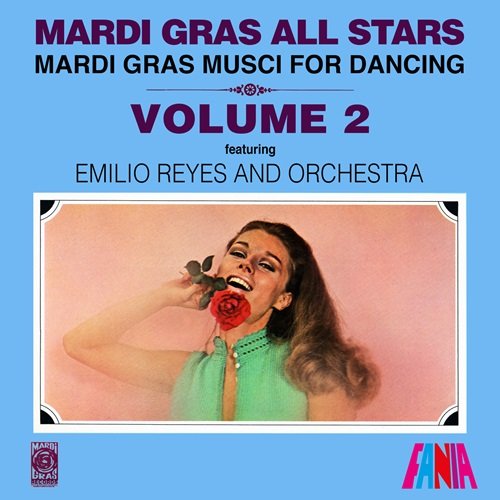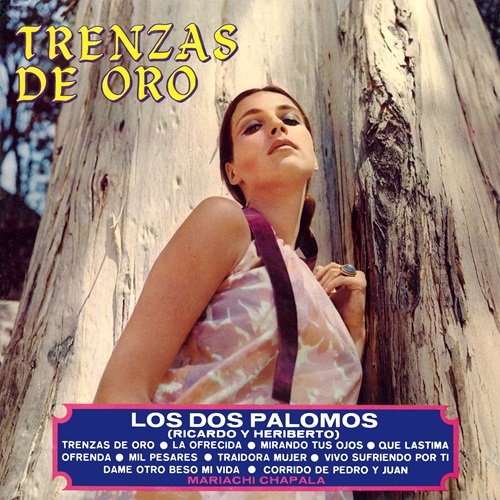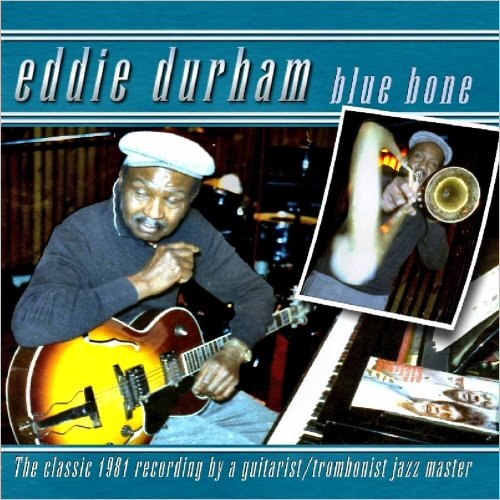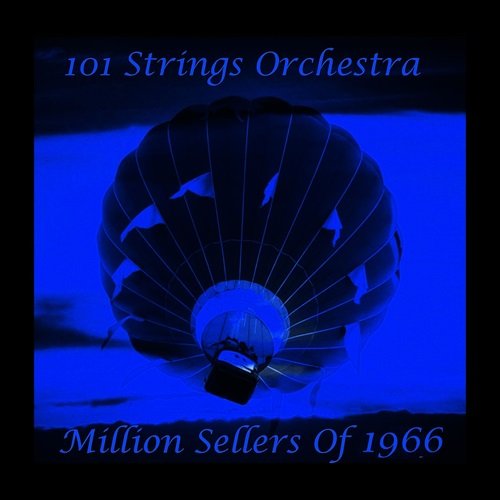Els 5 Xics - Todos sus singles en EMI-Regal (1968-1970) (2015 Remastered) (2015)
- 09 Oct, 11:40
- change text size:
Facebook
Twitter
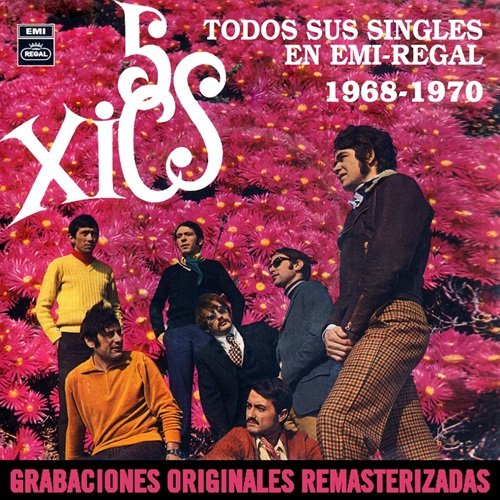
Artist: Els 5 Xics
Title: Todos sus singles en EMI-Regal (1968-1970) (2015 Remastered)
Year Of Release: 2015
Label: Parlophone
Genre: Garage Rock, Beat, Latin
Quality: Flac (tracks)
Total Time: 26:55
Total Size: 174 Mb
WebSite: Album Preview
Tracklist:Title: Todos sus singles en EMI-Regal (1968-1970) (2015 Remastered)
Year Of Release: 2015
Label: Parlophone
Genre: Garage Rock, Beat, Latin
Quality: Flac (tracks)
Total Time: 26:55
Total Size: 174 Mb
WebSite: Album Preview
01. La otra tarde (2015 Remaster) 3:53
02. Raising Your Hand (2015 Remaster) 2:18
03. Quand un home vol una dona (When a man loves a woman) (Remastered 2015) 2:59
04. Un poco de cariño (2015 Remaster) 2:10
05. El funeral (2015 Remaster) 2:42
06. Podría ser feliz (2015 Remaster) 2:17
07. El árbol del pan (2015 Remaster) 2:35
08. El hombre gris (2015 Remaster) 2:51
09. Oh, Girl (2015 Remaster) 2:28
10. En mi jardín (2015 Remaster) 2:43
One of the most humble neighbourhoods in Valencia is El Cabanyal, a seafaring neighbourhood with two and three-storey houses built mostly in the 19th and early 20th centuries. A historic neighbourhood that has now been almost wiped off the map by the extension of Avenida Blasco Ibáñez to the sea; an extension that has swept away entire streets, buildings such as La Lonja and more than 1,500 homes. In the 1960s it was a place somewhat abandoned to its fate by the municipal authorities. But in those years all of Spain made ¡Pop! and thousands of groups were formed throughout the country. And in El Cabanyal this group is called Els 5 Xics (The 5 Boys). All of the above is due to the context in which they move, very different from the wealthy neighbourhoods and university environments where other important Valencian groups were born at the same time.
The group was first formed in 1965 by José Manuel Ballester (singer), Antonio Pizá (guitar), Vicente Gay (bass and saxophone), Ramón Asensio (drums) and José Llusar (organ). Their initial style was a bit rough, pure garage, with covers of foreign songs and also some of their own songs. After gaining experience in the modest and sweaty Sunday dances in their neighbourhood, they made their first splash by winning first prize at a festival for new groups at the Teatro Ruzafa. They performed throughout the province and made a name for themselves in the world of dance groups. Finally, in 1967 they got their first recording contract with the modest label Sesión. One of their own songs: “Tiene los Ojos Azules” (Sesión, 1967) was their debut. Soon after, they will follow “El Chimpancé” (Sesión, 1967), a dance of their own invention set in their own neighbourhood, and “Española Bonita” (Sesión, 1967), with which they join the flamenco pop scene. These records sell quite well in their city, but are practically not released in any other province.
But the large number of records they sell in their homeland does not go unnoticed and EMI signs them the following year, passing them on to its subsidiary Regal. Here they have a certain freedom to choose their repertoire, but they are forced to record on the days off left by the stars of the label at a rate of 6-8 songs per session. These recordings are made in Barcelona, they return to their city and the label then publishes what it deems appropriate, leaving quite a few unpublished songs along the way. This is the time when they recorded their first album in Valencian: “Cuant Un Home Vol Una Dona” (Regal, 1968), a version of the well-known “When a man loves a woman” by Percy Sledge.
That year, the announcer Enrique Ginés, the soul of Valencian pop rock, organised a competition among listeners to find out which was the best group in the province. Los Huracanes were known throughout the country, Los Rockeros had the aura of having been Bruno Lomas’ support, Los Diapasons had managed to place a single in the national top 10 at the first opportunity, Adam Grup had a spectacular singer. But the young Valencians chose Els 5 Xics as the best group by a large majority. Their style has been polished a lot, the singer has improved noticeably and their style is now pop with certain influences from soul and psychedelia. Another important factor is the incorporation into the group of Bernardo Adam, an excellent organist with classical training who comes from Los Diapasons. A trumpet player also joined the band, which meant that the group, despite its name, had seven members for the time being. Their two most memorable albums were released: “El Funeral” (Regal, 1969) and “El Árbol del Pan” (Regal, 1969). This was the time of year when they frequently performed in the Basque Country, especially in winter; however, they remained unknown outside the Levantine lands.
In 1971, with some other changes in their line-up, they moved to the Unic label, where they adopted a certain party-like air with songs influenced by Formula V and other summer groups of the moment. At that time, they changed their name slightly. Since then, their records have been signed as 5 Chics. There was also a change of personnel. A young man of barely seventeen years old named Remigi Palmero joined the group as guitarist and occasional singer, who would later become one of the great Valencian musicians and a die-hard practitioner of Mediterranean rock. With Unic they recorded their last album in 1973, closing their recording career, practically becoming a dance band in 1976 with “Dímelo Tú” (Diplo, 1976).
Already retired and dedicated to other musical activities, they were asked to bring together their main songs on an LP –the first and last of their long career. They reunited briefly and took the opportunity to include some new songs on “Els 5 Xics” (Val, 1983).
Bernardo Adam is today one of the most prestigious orchestra and band directors in our country, some other members of the group work as conservatory teachers and almost all of them have kept music as a profession, working in the best dance orchestras in their region. For his part, Remigi Palmero worked with Pep Laguarda, was part of the trio In Fraganti and has made a good number of solo albums singing in Valencian.
Els 5 Xics was a modest, large group, which sold out its runs in its own region and hardly performed outside it. Very handicapped by having almost always played for second or third-rate labels, its evolutionary line is certainly notable. Many of the people who were lucky enough to dance to their rhythm say that in this aspect nobody surpassed them, that they were extraordinary professionals and that their records, in general, are a faint reflection of what they were capable of giving live.
In the book «Solo Para Fans» (Gerardo Irles, 1997) they are dismissed with some very apt lines: «Els 5 Xics were ventriloquists who did covers of foreign songs, sang vernacular melodies, testimonial songs or signed up to the tourist sound, but always with modest dignity». Personally, I stick with the objective fact that at the best moment of the Valencian groups, they were chosen by their countrymen as the best Valencian group.
The group was first formed in 1965 by José Manuel Ballester (singer), Antonio Pizá (guitar), Vicente Gay (bass and saxophone), Ramón Asensio (drums) and José Llusar (organ). Their initial style was a bit rough, pure garage, with covers of foreign songs and also some of their own songs. After gaining experience in the modest and sweaty Sunday dances in their neighbourhood, they made their first splash by winning first prize at a festival for new groups at the Teatro Ruzafa. They performed throughout the province and made a name for themselves in the world of dance groups. Finally, in 1967 they got their first recording contract with the modest label Sesión. One of their own songs: “Tiene los Ojos Azules” (Sesión, 1967) was their debut. Soon after, they will follow “El Chimpancé” (Sesión, 1967), a dance of their own invention set in their own neighbourhood, and “Española Bonita” (Sesión, 1967), with which they join the flamenco pop scene. These records sell quite well in their city, but are practically not released in any other province.
But the large number of records they sell in their homeland does not go unnoticed and EMI signs them the following year, passing them on to its subsidiary Regal. Here they have a certain freedom to choose their repertoire, but they are forced to record on the days off left by the stars of the label at a rate of 6-8 songs per session. These recordings are made in Barcelona, they return to their city and the label then publishes what it deems appropriate, leaving quite a few unpublished songs along the way. This is the time when they recorded their first album in Valencian: “Cuant Un Home Vol Una Dona” (Regal, 1968), a version of the well-known “When a man loves a woman” by Percy Sledge.
That year, the announcer Enrique Ginés, the soul of Valencian pop rock, organised a competition among listeners to find out which was the best group in the province. Los Huracanes were known throughout the country, Los Rockeros had the aura of having been Bruno Lomas’ support, Los Diapasons had managed to place a single in the national top 10 at the first opportunity, Adam Grup had a spectacular singer. But the young Valencians chose Els 5 Xics as the best group by a large majority. Their style has been polished a lot, the singer has improved noticeably and their style is now pop with certain influences from soul and psychedelia. Another important factor is the incorporation into the group of Bernardo Adam, an excellent organist with classical training who comes from Los Diapasons. A trumpet player also joined the band, which meant that the group, despite its name, had seven members for the time being. Their two most memorable albums were released: “El Funeral” (Regal, 1969) and “El Árbol del Pan” (Regal, 1969). This was the time of year when they frequently performed in the Basque Country, especially in winter; however, they remained unknown outside the Levantine lands.
In 1971, with some other changes in their line-up, they moved to the Unic label, where they adopted a certain party-like air with songs influenced by Formula V and other summer groups of the moment. At that time, they changed their name slightly. Since then, their records have been signed as 5 Chics. There was also a change of personnel. A young man of barely seventeen years old named Remigi Palmero joined the group as guitarist and occasional singer, who would later become one of the great Valencian musicians and a die-hard practitioner of Mediterranean rock. With Unic they recorded their last album in 1973, closing their recording career, practically becoming a dance band in 1976 with “Dímelo Tú” (Diplo, 1976).
Already retired and dedicated to other musical activities, they were asked to bring together their main songs on an LP –the first and last of their long career. They reunited briefly and took the opportunity to include some new songs on “Els 5 Xics” (Val, 1983).
Bernardo Adam is today one of the most prestigious orchestra and band directors in our country, some other members of the group work as conservatory teachers and almost all of them have kept music as a profession, working in the best dance orchestras in their region. For his part, Remigi Palmero worked with Pep Laguarda, was part of the trio In Fraganti and has made a good number of solo albums singing in Valencian.
Els 5 Xics was a modest, large group, which sold out its runs in its own region and hardly performed outside it. Very handicapped by having almost always played for second or third-rate labels, its evolutionary line is certainly notable. Many of the people who were lucky enough to dance to their rhythm say that in this aspect nobody surpassed them, that they were extraordinary professionals and that their records, in general, are a faint reflection of what they were capable of giving live.
In the book «Solo Para Fans» (Gerardo Irles, 1997) they are dismissed with some very apt lines: «Els 5 Xics were ventriloquists who did covers of foreign songs, sang vernacular melodies, testimonial songs or signed up to the tourist sound, but always with modest dignity». Personally, I stick with the objective fact that at the best moment of the Valencian groups, they were chosen by their countrymen as the best Valencian group.


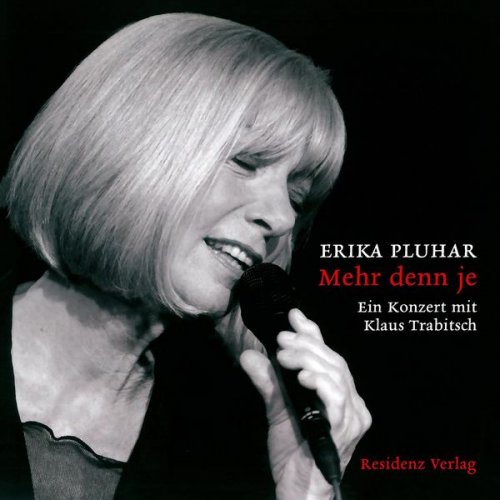
![Victoria Port - Barefoot In The Garden (2025) [Hi-Res] Victoria Port - Barefoot In The Garden (2025) [Hi-Res]](https://img.israbox.com/img/2025-12/29/ewzd0szcsnv1f02bzk1gno02h.jpg)
![Nighthawks - Paris Dakar (2025) [Hi-Res] Nighthawks - Paris Dakar (2025) [Hi-Res]](https://www.dibpic.com/uploads/posts/2025-12/1767093398_folder.jpg)
